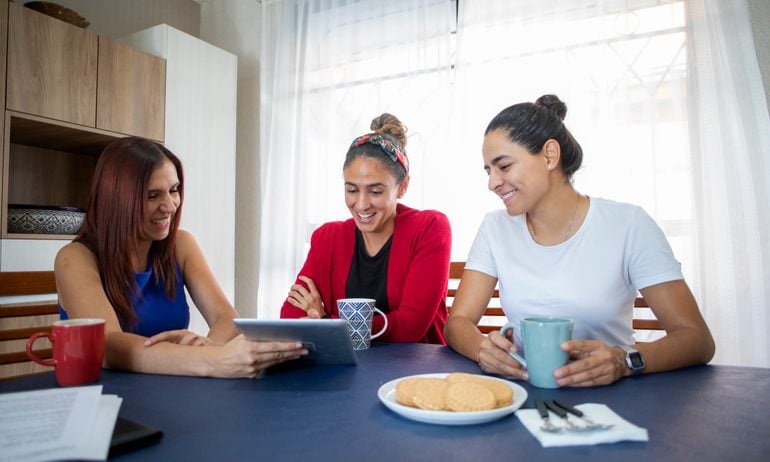How LGBTQ+ Home Buyers Can Find Allies in the Market
Real estate agents who specialize in working with LGBTQ+ buyers are among the homebuying resources that can make a difference.

Some or all of the mortgage lenders featured on our site are advertising partners of NerdWallet, but this does not influence our evaluations, lender star ratings or the order in which lenders are listed on the page. Our opinions are our own. Here is a list of our partners.
Overwhelmingly, home buyers view finding the right home as the hardest part of the buying process. There’s so much to consider: What can I afford? How much space do I need? And the most harrowing question of all — what am I willing to give up?
This question is even more loaded for LGBTQ+ buyers, who may face the added pressure of evaluating a new community for safety and comfort.
Social attitudes have dramatically shifted from the days where queer and transgender buyers were concentrated in just one or two neighborhoods, points out Barbara Stone, a Realtor in Dallas, Texas. Today, the community is made up of buyers with a diverse set of needs and preferences, including families with children, professionals who need to be close to business hubs, rural homeowners and many more.
Regardless of what that dream home looks like, LGBTQ+ buyers can seek out the resources available to them, the most valuable of which may be hiring a buyer’s agent who is experienced in working with the community.
What comfort looks like in a listing
LGBTQ+ home buyers often have to get creative in defining and communicating intangible but necessary qualities. For Kathleen Myers, a Realtor with Re/Max Equity Group in Clackamas, Oregon, the word that clients frequently land on is “privacy.”
“This often means a very private backyard, not having neighbors right on top of you,” she says, making yard space a priority commodity. “Privacy really is about safety.”
This idea of safety goes beyond fears of physical violence or crime, Myers says. When she and her partner bought their home, they were encouraged by a sign in their new neighbors’ front yard that read “In our community, all people are welcome.”
“While it may seem really insignificant to some, that was actually really important to us when we decided to make an offer on the house,” she explains.
Stone says that questions of safety and acceptance are frequently among the first questions she’s asked by clients relocating to Texas. “It is a very valid concern to have.”
By describing the qualities that provide a sense of comfort and safety in whatever environment best suits them, buyers can get the most from their home search — and from their agent.
How LGBTQ-friendly real estate agents can be vital resources
As members of the local community, the wealth of knowledge that buyers’ agents can provide goes beyond setting up tours or negotiating contracts.
For example, same-sex parents or parents of LGBTQ+ children often have questions about schools, Stone says. When children are a factor in the home search process, she’s able to connect clients with local professionals who know which schools have established support programs for LGBTQ+ families. She also directs them toward news articles documenting schools where incidents of bullying have been cited.
LGBTQ+ buyers may also bring unique financial circumstances to the table. For example, Stone says, she has historically seen queer women looking at lower-priced homes and dealing with a level of scrutiny in their loan application that exceeded their male counterparts. A 2022 analysis from the Federal Reserve Bank of St. Louis shows that more self-identifying lesbian and bisexual women have household savings and investments below $250,000 than men of any sexual orientation. The analysis shows that this is also the case for adults who identify as transgender, nonbinary or other.
Real estate agents with a history of working with LGBTQ+ clients can be vital advisors. Knowing what has worked for clients in the past, Stone has guided buyers through the maze of social and financial considerations — and has even pointed them toward queer-friendly lenders.
Where to find a queer-friendly real estate agent
“I think it’s an absolute must that any LGBTQ+ couple or family with an LGBTQ+ member find an agent that has this experience and these resources,” Stone advises.
Buyers can find queer- and trans-friendly agents in their community through networks like gayrealestate.com and the National Association of Gay and Lesbian Real Estate Professionals. Some real estate firms also have agent groups that work specifically with the LGBTQ+ community, such as the Keller Williams Rainbow Network and the Corcoran Perry & Co. “Live Proud” team in Denver, Colorado.
For home shoppers who have existing ties to the city or region they’re buying into, personal recommendations can also be a great place to start.
Other resources for LGBTQ+ home buyers
Beyond working with an agent familiar with the area and the needs of LGBTQ+ homeowners, buyers of any gender identity or orientation can take advantage of financial and informational resources.
Home buyer assistance programs. These are grants or favorable loans offered by local and state governments and nonprofit organizations, which can help offset down payment and closing costs.
Low down payment mortgages. Loans insured by the Federal Housing Administration (called FHA loans) require just 3.5% down, while loans backed by the Department of Veterans Affairs (VA loans) and the Department of Agriculture (USDA loans) don’t require a down payment at all. And despite what you may have heard, some conventional mortgages only require 3% down.
Home search platforms partnering with the Movement Advancement Project. Some websites like Trulia and Zillow have partnered with MAP, a nonprofit research and advocacy group, to include information about local laws and policies that impact LGBTQ+ buyers within property listings.
LGBTQ-supportive financial advisors. These professionals can help buyers meet their financial goals, manage debt and access tools and assistance, among other services.




